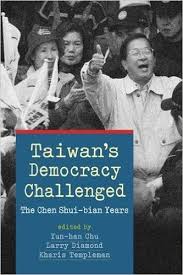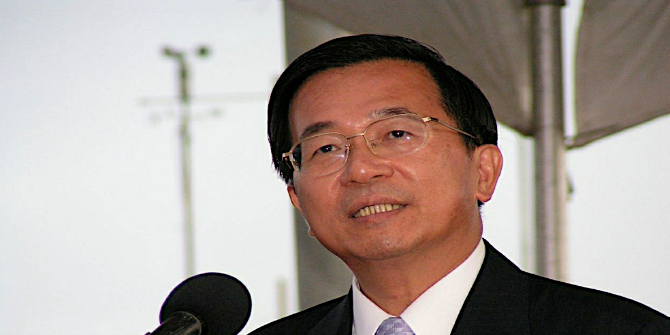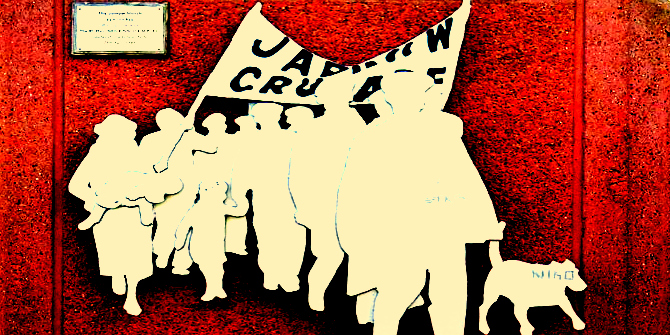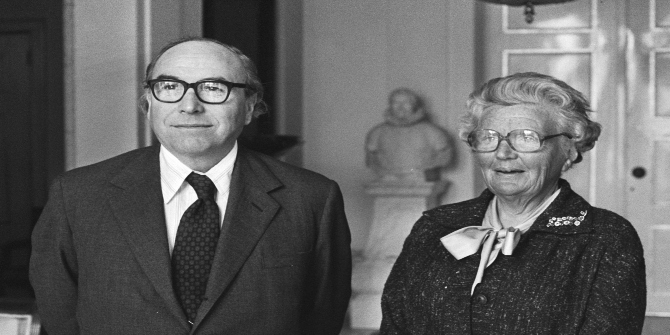In Taiwan’s Democracy Challenged: The Chen Shui-bian Years, editors Yun-han Chu, Larry Diamond and Kharis Templeman provide a reassessment of Taiwan’s political landscape between 2000 and 2008: the years in which Chen Shui-bian, Taiwan’s first non-Kuomintang president, was in office. This new systematic, impartial and evidence-based evaluation of Chen’s presidency is a must-read for students and scholars researching contemporary Taiwanese politics, finds M. Bob Kao.
Taiwan’s Democracy Challenged: The Chen Shui-bian Years. Yun-han Chu, Larry Diamond and Kharis Templeman (eds). Lynne Rienner Publishers. 2016.
 Taiwan’s Democracy Challenged: The Chen Shui-bian Years is a difficult book to read, not because the writing is awkward or sloppy – though the quality is undoubtedly uneven across the different contributions – but because each chapter is abundantly filled with detailed material and analyses. Together, they make this edited collection on Taiwanese democracy during Chen Shui-bian’s presidency a must-read for Taiwanese scholars and students of Taiwan. Academics should strongly consider assigning selected chapters, or even the entire book, as required reading for their Asian studies, political science, law, communications or sociology courses.
Taiwan’s Democracy Challenged: The Chen Shui-bian Years is a difficult book to read, not because the writing is awkward or sloppy – though the quality is undoubtedly uneven across the different contributions – but because each chapter is abundantly filled with detailed material and analyses. Together, they make this edited collection on Taiwanese democracy during Chen Shui-bian’s presidency a must-read for Taiwanese scholars and students of Taiwan. Academics should strongly consider assigning selected chapters, or even the entire book, as required reading for their Asian studies, political science, law, communications or sociology courses.
This collection tells the story of the development of democracy in Taiwan between 2000 and 2008 when Chen Shui-bian of the Democratic Progressive Party (DPP), the first non-Kuomintang (KMT) president of Taiwan, was in office. By the time his second term ended, Chen’s approval rating was in the gutter, and soon after he was convicted of corruption and sentenced to twenty years imprisonment. In the last few years, the perception of Chen has begun to improve, and this increase in public support was likely to have been partly responsible for his release on medical parole. Taiwan’s Democracy Challenged, co-edited by political scientists Yun-han Chu and Kharis Templeman and political sociologist Larry Diamond, is situated as part of this larger project to critically evaluate Chen’s presidency in a more systematic, impartial and evidence-based manner.
While the book is temporally defined by Chen’s spell as president, he was just part of an ensemble cast. The DPP, its various factions, the KMT that still controlled the legislative branch, civil society, China, the United States, other branches of the government, the business sector and the media – all were important characters in the advancement, and at times obstruction, of democracy in Taiwan, and all are analysed in the book.
 Image Credit: Chen Shui-bian (Jamali Jack CC BY SA 3.0)
Image Credit: Chen Shui-bian (Jamali Jack CC BY SA 3.0)
After the introductory chapter (which does not waste space on a brief history of Taiwanese history like many other books on Taiwan), the collection is divided into four parts, each containing two to four chapters. The first, ‘Politics and Public Opinion’, provides analyses on party politics and elections, the performance of the DPP in elections, the false narrative of the Taiwanese public becoming more polarised during the Chen years and party biases in the support for democracy and opinions on the quality of governance. This is followed by the ‘Democratic Institutions in Action’ section, which discusses the relationship between the executive and legislative branches, the Judicial Yuan and Control Yuan in the development of horizontal accountability and the rule of law and the debate on constitutional reforms to alleviate the deadlock created by different parties controlling the presidency and the legislative branch.
Part Three, ‘State-Society Relations’, concerns the engagement of civil society in politics through participation in government commissions; the role of the media in the decline of the political environment; the new state-business relations with the appointment of DPP members to lead state-run businesses which ultimately led to the various corruption scandals; and the DPP’s failure to take over and emulate the KMT’s system of patronage. Finally, the collection ends with Part Four, ‘National Security and Cross-Strait Relations’, comprising chapters titled ‘Depoliticizing Taiwan’s Security Apparatus’ and ‘Troubled Waters: The Conflict over Cross-Strait Relations’.
A noteworthy characteristic of this collection is the number of scholars who are based in Taiwan, part of a trend of recent English-language academic literature written by Taiwanese scholars or scholars based in the country. Out of the nineteen contributors, including the three editors, only four are based outside of Taiwan.
Two omissions are particularly notable. First, the mass protests against Chen’s corruption in 2006 are only mentioned twice in the collection, once in Chu, Min-hua Huang and Yu-tzung Chang’s ‘Polarized Politics and Support for Democracy’, and then in ‘Restructuring State-Business Relations’ by James W.Y. Wang, Shang-mao Chen and Cheng-tian Kuo. Dubbed the ‘Million Voices Against Corruption’, the street demonstrations and sit-ins lasted three months and were led by former DPP chairman and political prisoner Shih Ming-teh. That a long-term fellow activist – Shih was a defendant in the 1979 Kaohsiung Incident while Chen was the criminal defence attorney for a co-defendant – aligned himself with the KMT that once imprisoned and tortured him to call for Chen’s resignation surely contributed, whether positively or negatively, to the development of democracy in Taiwan. A more substantial treatment of this episode to unpack its layers may provide a fuller story of Chen’s final two years in office.
Second, Weitseng Chen and Jimmy Chia-Shin Hsu’s ‘Horizontal Accountability and the Rule of Law’, which investigates the independence, supremacy, accountability and capability of the judicial branch, overlooks the crucial composition of the Constitutional Court that decided the cases discussed. What effect, if any, did a Court consisting solely of Chen appointees after 2003 have on its political influence? ‘After the change in ruling parties in 2000, the [Constitutional] Court struggled to have the positive impact that it had had in the 1990s’ (150), the authors argue, as having two parties instead of just the KMT looking to it to resolve disputes meant that it had to tread more carefully in order to insulate itself politically. While that may be the overarching explanation, is it not possible that the appointment of justices by Chen to a Constitutional Court that was always packed with KMT members complicated the issue? The Court, while an institution, is composed of individual justices whose backgrounds may have affected the internal politics of the Court and its interactions with other branches of government.
Taiwan’s Democracy Challenged leaves one with mixed feelings about Chen’s legacy, which probably is an indication that the volume has succeeded in portraying at least some version of reality. Democracy in Taiwan during Chen’s presidency developed but also stalled. Nonetheless, this book shows that, despite low public opinion when he left office, much of what happened was beyond Chen’s control. He was an easy scapegoat whose corruption scandals were convenient to latch onto. As the co-editors note: ‘The ugly headlines and incendiary political rhetoric of the era have overshadowed subtler but more important political changes that occurred, both good and bad, in Taiwanese politics and society’ (11). A clearer picture of the role of Chen and other players during his presidency in the democratic consolidation in Taiwan will emerge in the years to come, but for now, this collection’s contribution to the literature and the field should not be missed.
M. Bob Kao is a PhD candidate at the Centre for Commercial Law Studies, Queen Mary, University of London. He was a public interest lawyer in California and has taught American law in Taiwan and China. Read more reviews by M. Bob Kao.
Note: This review gives the views of the author, and not the position of the LSE Review of Books blog, or of the London School of Economics.








1 Comments